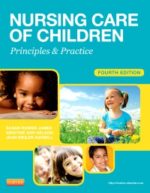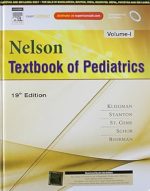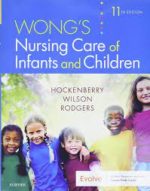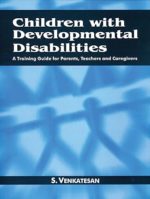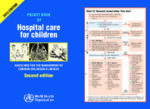-
Nelson Textbook of Pediatrics, 2-Volume Set, 21st Edition
KSh 25,200.00Nelson Textbook of Pediatrics – the reference of choice among pediatricians, pediatric residents, and others involved in the care of young patients. This fully revised edition continues to provide the breadth and depth of knowledge you expect from Nelson, while also keeping you up to date with new advances in the science and art of pediatric practice. Authoritative and reader-friendly, it delivers the information you need in a concise, easy-to-use format for everyday reference and study. From rapidly changing diagnostic and treatment protocols to new technologies to the wide range of biologic, psychologic, and social problems faced by children today, this comprehensive 2-volume reference keeps you on the cutting edge of the very best in pediatric care.
Key Features-
- Includes more than 70 new chapters, including Postural Orthostatic Tachycardia Syndrome (POTS), Rare and Undiagnosed Diseases, Approach to Mitochondrial Disorders, Electronic Nicotine Delivery Systems, Zika, update on Ebola, Epigenetics, Autoimmune Encephalitis, Global Health, Racism, Media Violence, Strategies for Health Behavior Change, Positive Parenting, and many more.
-
- Features hundreds of new figures and tables throughout for visual clarity and quick reference.
-
- Offers new and expanded information on CRISPR gene editing; LGBT health care; gun violence; vaccinations; immune treatment with CAR-T cells; new technology in imaging and genomics; new protocols in cancer, genetics, immunology, and pulmonary medicine; and much more.
-
- Provides fresh perspectives from four new associate editors: Nathan J. Blum of The Children’s Hospital of Philadelphia; Karen Wilson of Mt. Sinai School of Medicine in New York; Samir S. Shah of Cincinnati Children’s Hospital Medical Center; and Robert C. Tasker of Boston Children’s Hospital.
-
- Provides regular updates online, written exclusively for Nelson.
-
- Remains your indispensable source for definitive, evidence-based answers on every aspect of pediatric care.
-
- Enhanced eBook version included with purchase. Your enhanced eBook allows you to access all of the text, figures, and references from the book on a variety of devices.
Author InformationBy Robert M. Kliegman, MD, Professor and Chair Emeritus, Department of Pediatrics, Medical College of Wisconsin, Children’s Hospital of Wisconsin, Milwaukee, Wisconsin and Joseph St. Geme, MD, Chair, Department of Pediatrics, Professor of Pediatrics and Microbiology, Perelman School of Medicine at the University of Pennsylvania; Physician-in-Chief, Leonard and Madlyn Abramson Endowed Chair in Pediatrics, Children’s Hospital of Philadelphia, Philadelphia, Pennsylvania -
-
Nursing Care of Children, 4th Edition
KSh 18,016.00Master the art of caring for children with most effective, efficient, and affordable title on pediatric nursing care. Taking on a family focus, this student-friendly text teaches growth, development, and information on the major body system alterations. Plus, dramatically streamlined content and new learning tools make this new edition even more tailored to your learning needs.
-
Nelson Textbook of Pediatrics_vol 1
KSh 12,000.00The worlds most trusted pediatrics resource continues to provide the most authoritative coverage of the best approaches to care in this streamlined new edition. With two new editors, extensive updates, and expanded online features, youll have the well-rounded, up-to-date guidance you need to offer your patients the very best. ? Stay current on recent developments and hot topics such as melamine poisoning, long-term mechanical ventilation in the acutely ill child, sexual identity and adolescent homosexuality, age-specific behavior disturbances, and psychosis associated with epilepsy. ? Tap into substantially enhanced content with world-leading clinical and research expertise from two new editors Joseph W. St. Geme III, MD, and Nina F. Schor, MD, PhD who contribute on key subspecialties, including pediatric infectious disease and pediatric neurology. ? Manage the transition to adult healthcare for children with chronic diseases through discussions of the overall health needs of patients with congenital heart defects, diabetes, and cystic fibrosis. ? Recognize, diagnose, and manage genetic conditions more effectively using an expanded section that covers these diseases, disorders, and syndromes extensively.
-
Wong’s Nursing Care of Infants and Children 11th Edition
KSh 9,660.00Wong’s Nursing Care of Infants and Children, 11th Edition takes a unique, easy-to-follow developmental approach to describe the care of children at each age and stage of development. This longtime bestseller provides an evidence-based, clinical perspective that shows how the quality of nursing care can impact quality patient outcomes. Childhood diseases and disorders are organized by age groups and body systems and explained through the nursing process framework. This edition features completely updated and reorganized chapters that present content in a clear, easy-to-understand way. New Quality Indicator boxes paint a bigger picture of hospitals and how they look at quality and safety.
- A focus on family-centered care emphasizes the role and influence of the family in health and illness with a separate chapter and Family-Centered Care boxes.
- Emergency Treatment boxes serve as a quick reference in critical situations.
- Pathophysiology Reviews explain complicated disease processes with illustrated summary boxes.
- Quality Patient Outcomes are discussed for major childhood diseases and disorders, showing how nursing care directly impacts patient outcomes.
- Nursing Tips include helpful hints and practical, clinical information.
- Critical Thinking Case Studies help you test and develop your own analytical skills.
- Cultural Considerations provide cultural tips from clinical experts.
- Nursing Care Plans provide models for planning patient care, with rationales explaining why specific nursing interventions have been chosen, and include nursing diagnoses, patient/family goals, nursing interventions/rationales, expected outcomes, and NIC and NOC guidelines.
- Nursing Care Guidelines offer clear, step-by-step, detailed instructions on performing specific skills or procedures.
- Translating Evidence into Practice and Applying Evidence to Practice boxes help you apply research to support, guide, and improve the outcomes of nursing care.
- Atraumatic Care boxes contain techniques for care that minimize pain, discomfort, or stress, and provide guidance for performing procedures in a caring manner.
- Community and Home Health Considerations boxes focus on wellness information and illness-related topics.
- Drug Alerts highlight important drug-related information for safe, appropriate care.
- Nursing Alerts provides critical information that must be considered in providing care.
- Research Focus boxes emphasize research with concise reviews of important evidence.
- Nursing Alerts provides critical information that must be considered in providing care.
-
Children with Developmental Disabilities: A Training Guide for Parents, Teachers and Caregivers First Edition
KSh 6,370.00This manual is designed as a guide for parents, teachers and caregivers dealing with children up to the age of six who are afflicted by developmental disabilities. The author provides details of more than 400 non-formal activities along with guidelines on how to use them both at home and in pre-school settings.
The book is divided into three sections:
– the first describes a wide range of impairments, disabilities and handicaps along with information on their manifestations and characteristics. The author also outlines steps to handle negative or problem behaviour during training.
– the next section presents a Comprehensive Activity Checklist for pre-school children. All items have been empirically tested and are located on a scale of increasing difficulty.
– the third section comprises two chapters. The first is a `do-it-yourself` activity assistance guide which will be of immense use to trainers, caregivers, teachers and parents. In the last chapter, Dr Venkatesan discusses contemporary problems and issues related to the rights and privileges of persons with developmental disabilities -
Pocket book of hospital care for children
KSh 3,640.00This is the second edition of the Pocket book of hospital care for children. It is for use by doctors, nurses and other health workers who are responsible for the care of young children at the first level referral hospitals. The Pocket Book is one of a series of documents and tools that support the Integrated Management of Childhood Illness (IMCI). It is an update of the 2005 edition, and presents up-to-date evidence based clinical guidelines from several recently updated and published WHO guidelines and recommendations. The guidelines are for use in both inpatient and outpatient care in hospitals with basic laboratory facilities and essential medicines. These guidelines focus on the management of the major causes of childhood mortality in most developing countries, such as newborn problems, pneumonia, diarrhoea, malaria, meningitis, septicaemia, measles and related conditions, severe acute malnutrition and paediatric HIV/AIDS. It also covers common procedures, patient monitoring and supportive care on the wards and some common surgical conditions that can be managed in small hospitals.
Details of the evidence on which the Pocket Book is based can be found on the WHO website from the relevant published guidelines provided in the bibliography. This bedside paediatric care guidelines are applicable in most areas of the world and may be adapted to suit country specific circumstances. However, advanced and high care treatment options, such as intensive care or mechanical ventilation, are not described. The Pocket Book is also available in hard copies although the online version will be updated regularly as new evidence emerges.


